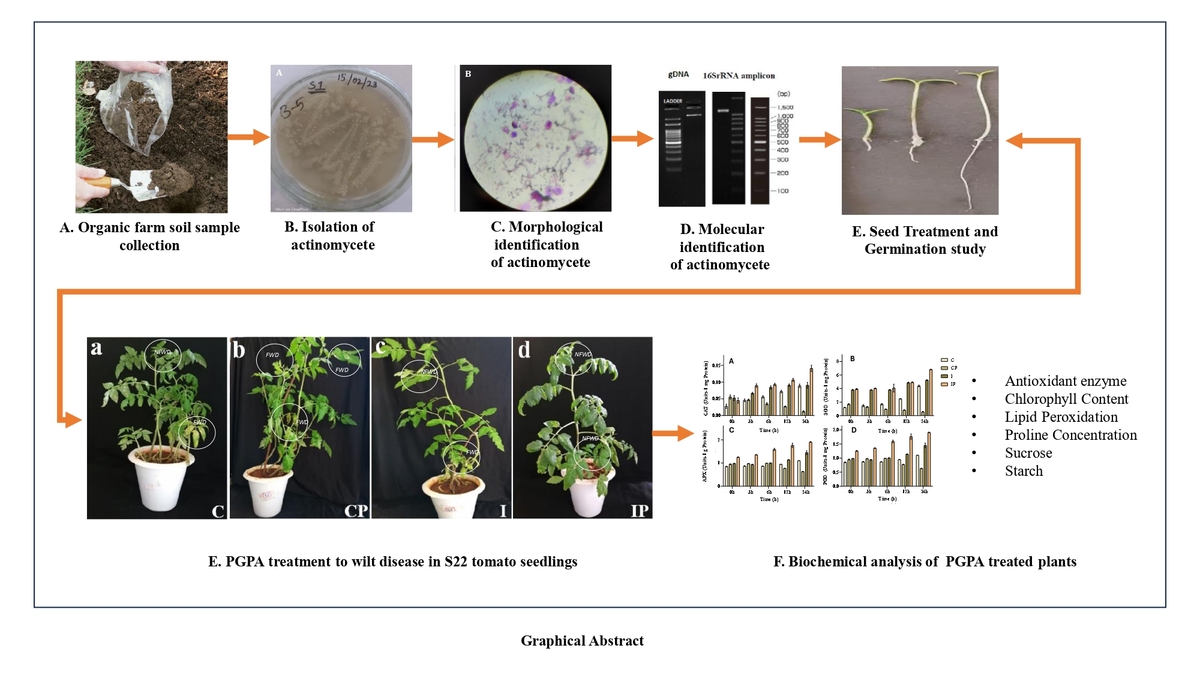ORIGINAL ARTICLE
Organic Soil-Derived Saccharopolyspora thermophila Actinomycete for Enhancing Plant Growth and Controlling Fusarium Wilt Disease in Tomato
1
Department of Studies and Research in Environmental Science, Tumkur University, BH Road, 572103, TUmakuru, India
2
Department of Studies and Research in Biotechnology and Microbiology, Tumkur University, BH Road, 572103, Tumakuru, India
3
Department of Environmental Science, Central University of Kerala, Tejaswini Hills, 671320, Periye, India
4
Department of Studies and Research in Biotechnology and Microbiology, Tumkur Univertsity, BH Road, 572103, Tumakuru, India
A - Research concept and design; B - Collection and/or assembly of data; C - Data analysis and interpretation; D - Writing the article; E - Critical revision of the article; F - Final approval of article
Submission date: 2024-10-01
Acceptance date: 2025-06-23
Online publication date: 2025-07-09
Corresponding author
Sharatchchandra Ramasandra Govind
Department of Studies and Research in Biotechnology and Microbiology, Tumkur Univertsity, BH Road, 572103, Tumakuru, India
Department of Studies and Research in Biotechnology and Microbiology, Tumkur Univertsity, BH Road, 572103, Tumakuru, India
HIGHLIGHTS
- PGPA treatment significantly reduced disease, and increased plant health
- This work lays a solid basis for the creation of S. thermophila-based bioinoculants
- PGPA are natural control agents for potential and sustainable agriculture
KEYWORDS
F. oxysporumPGPAS. thermophilaAnti-Oxidant Enzymes. Chlorophyll. Lipid Peroxidation. Sucrose. Starch
TOPICS
ABSTRACT
This study investigated the effects of Saccharopolyspora thermophila, a plant growth-promoting actinomycete (PGPA), on tomato plants (Suvarna 22) and its potential to mitigate Fusarium wilt disease. S. thermophila was isolated from organic farm soil and molecularly identified through 16S rRNA sequencing. Seed treatment with S. thermophila significantly enhanced germination rates (83% vs 59% in control) and seedling vigor (625 vs 192 in control). Treated plants exhibited improved growth parameters, including increased plant height (83.3%), chlorophyll content (88.2%), and fruit yield (66.7%). Under pathogen challenge, S. thermophila-treated plants showed reduced disease incidence (37% vs 92% in untreated plants). Biochemical analyses revealed that S. thermophila treatment enhanced antioxidant enzyme activities (CAT, SOD, APX, POD) and maintained higher chlorophyll content under pathogen stress. The treatment also moderated pathogen-induced increases in lipid peroxidation and proline levels, indicating improved stress tolerance. Interestingly, S. thermophila treatment counteracted pathogen-induced starch depletion and moderated sucrose accumulation, suggesting a complex interplay in plant metabolism regulation. These findings demonstrated the potential of S. thermophila as a PGPA to enhance tomato plant growth, productivity, and resilience against Fusarium wilt disease. The study provides insights into the physiological and biochemical mechanisms underlying PGPA-mediated plant growth promotion and disease resistance, offering promising avenues for sustainable agricultural practices.
CONFLICT OF INTEREST
The authors have declared that no conflict of interests exist.
We process personal data collected when visiting the website. The function of obtaining information about users and their behavior is carried out by voluntarily entered information in forms and saving cookies in end devices. Data, including cookies, are used to provide services, improve the user experience and to analyze the traffic in accordance with the Privacy policy. Data are also collected and processed by Google Analytics tool (more).
You can change cookies settings in your browser. Restricted use of cookies in the browser configuration may affect some functionalities of the website.
You can change cookies settings in your browser. Restricted use of cookies in the browser configuration may affect some functionalities of the website.




